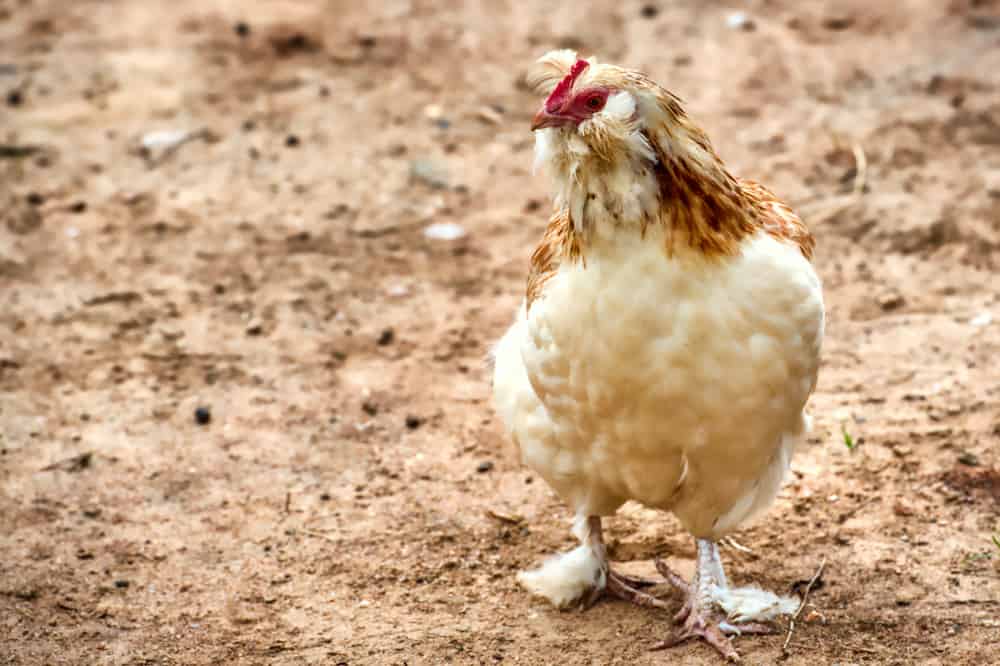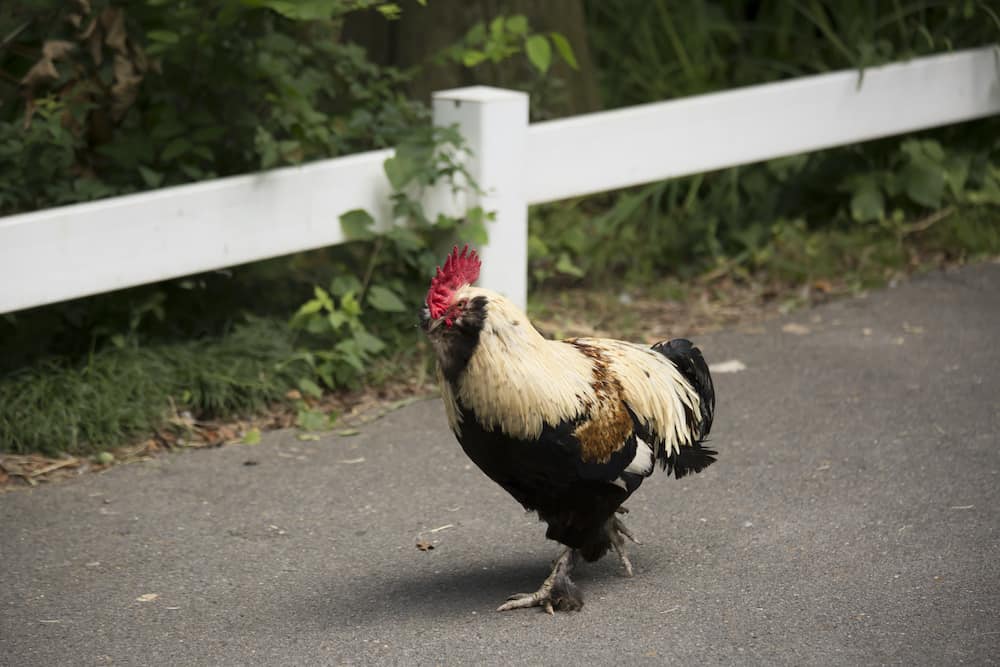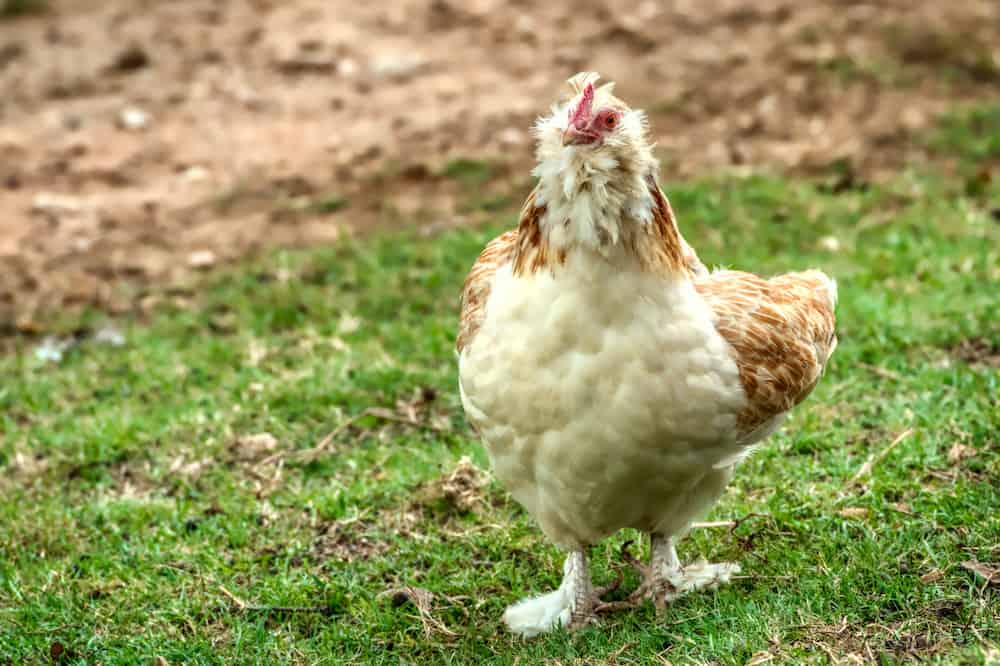If you love chickens, then having a Salmon Faverolle can be a great fit for you. They are fun-loving creatures well-known for their adorable and outgoing personalities. These chickens are always excited to see you coming and often hope you have some sort of treat for them. This breed is talkative and their fun demeanors make them great little companions.
If you’re looking for a dual-purpose chicken or a chicken for exhibition, this could be a good choice for you.
Let’s take a closer look at the Salmon Faverolle chickens. We discuss the breed, how often they lay, and how to care for them to see if you’d like to add them to your backyard or farm.
Getting to Know Salmon Faverolles
Originally, the Salmon Faverolles were raised in Faverolles, France. There are no records for this breed that show their exact genetic composition, making it hard to know what they were mixed with.
History
This breed became popular because many farmers wanted to have chickens that were good at laying eggs and offered a good amount of meat. The Houdan chicken was the first option, but they became unruly when caging the birds became common practice. It was tough for the farmers to continue doing their job since the chickens were not agreeable.
This also made them search for a breed that handled cages better than Houdan chickens did. That is when they started using Salmon Faverolles chickens.
They did not have the same issues with the cage and had not yet picked up any bad habits that made the farmer’s job harder. These hens did very well inside cages and adjusted well to foraging. This made this breed a top choice for farmers to use for egg-laying.
The Salmon Faverolle chicks stayed popular in France but begun to get imported to England and the surrounding areas. After 1894, the English worked with these chickens regularly and decided on a standard for the breed.
This standard kept the birds in the best shape for egg-laying and keeping the meat for consumption.
Just a few years later, these birds were imported to North America by way of New York. The great Doctor Phelps in Glen Falls is credited with the importation of the Salmon Faverolle.
Temperament
Before starting with chickens or adding more to your brood, it’s important to know how the breed behaves. Here’s what to know:
Around Humans
One of the most well-known things about the Salmon Faverolle breed is their funny personality. They are often loud and tend to like it when you talk to them. They will even make noises for you as if they are engaging in the conversation. This can be a funny and adorable quality that people find amusing in this breed.
They are also an affectionate breed that tends to follow their owners around and beg for treats. It is also common for them to run to you when they see you walking toward them.
This affection is endearing to many owners and a popular reason for having this breed in your backyard.
With Other Chickens
The Salmon Faverolles are gentile with those around them, making them great to have with other chicken breeds. However, they also tend to have an odd ritual with their own breed when they are outside. They will run about the yard bumping into other chickens as if they are giving them a chest-bump.
Then, they often continue on their path as if they have a specific problem to attend to. This can make them quite an entertaining group to watch when you have multiple chickens together.
You may have to be careful about how you keep things in and around the coop since they are curious creatures.
Salmon Faverolle hens and chicks tend to get into lots of things when they can, and could get mischievous with lots to explore.
Offering areas where they can go inside to look around, find hidden spots to sit, or having obstacles can help keep them busy.
Broodiness in Hens
Since this breed of hens is so outgoing and curious, it is often easy to tell when they have gone broody. Unlike their usual active selves, the hen will stay on her egg and not be as active.
When they get broody, they have their maternal instincts come flooding in. That means they will want to protect their egg and allow it to grow into a chick.
That said, if you harvest their eggs regularly, you do not want the hens to get broody. So, the best way to keep this from happening is to collect her eggs right away.
This will keep her from feeling too attached and motherly. You may also want to keep her away from her egg-laying area when she is not laying.
This will give the Salmon Faverolle hen a specific space for laying that will not be the same as anywhere else. Once she is removed from that area, she will no longer feel like she has to lay eggs.
These methods can help stop a hen from getting broody after laying an egg. Do these things as often as possible to keep your hens from getting broody in the future, too.

What Do Salmon Faverolles Look Like?
The appearance of hens and roosters of this chicken breed somewhat look differently. Here’s what they each look like:
Hens
The Salmon Faverolle hens have a light complexion that seems to go well with their personality. They have white bellies with shades of brown and tan along the back, as well as a distinct red tuft of feathers in a line on their heads. That is often said to resemble the mohawk hairstyle for humans.
Their beaks tend to have a tan color with just a tint of pinkish color. Also, their wattles are usually the same in size or can be completely unseen. Their feathers tend to be larger than other chickens and make them look like they are bigger. However, they tend to be a bit slimmer than the feathers make them appear to be.
Most of their body has a pinkish tint, from the feathers to their beaks. This is where their name comes from since they have a salmon color on their bodies.
Salmon Faverolle Roosters
Though the female Salmon Faverolle chicks or chickens tend to have a similar appearance, the roosters look very different. Roosters are almost all black and have only small areas of different colors. Most of the feathers are black, but the tail primaries have a greenish-shine that makes them appear iridescent.
The bow of its wings has a golden hue to it, and the tip is speckled white. Although the Salmon Faverolle rooster looks different than the hens, they have similar personalities. The roosters also tend to be excitable and fun. Compared to other roosters, they are mostly calm creatures.
Are Salmon Faverolles Good Layers?
When keeping chickens for egg-laying, you want to ensure that they are a good breed for the job. Luckily, Salmon Faverolle chickens are good egg layers throughout the year.
Salmon Faverolles lay 180 – 200 eggs per year. This is the equivalent of one egg every two days on average. That means you will have another egg every other day during the week from each hen.
With this amount, the yearly production stays at a pretty consistent. Also, these hens will lay throughout the year, even weeks into the winter season. Their eggs are medium size.
What Color are Salmon Faverolle Eggs?
The color of the eggs that these chickens lay is typically a lighter brown or tan. It can vary between birds; some eggs can be a bit lighter or darker than the average. Sometimes, you will even get an egg with some pinkish tints, just like the birds themselves.
This is usually very light and not noticeable without closer inspection. If you see a slightly larger egg, you can clearly see the color a bit more than the smaller ones.
Regarding egg size, you determine it not by the diameter of the egg itself, but by the weight. A large egg is around 25 ½ ounces. Most of the eggs these chickens hatch are a medium size, which is around 20 ½ ounces.
What are Salmon Faverolles Good for?
When choosing among chicken breeds, it’s important to consider the reason you want them. Is it for egg production? Meat? Breeding?
Salmon Faverolles are a dual-purpose breed, making them a good choice if you want to raise chickens for eggs and meat. Do you want to show them in exhibitions? This breed is often raised for showing as well.

Do Salmon Faverolle Roosters Crow?
Some roosters are louder than others. In addition, there are roosters that crow more frequently and others who do so mostly in the mornings.
In this case, Salmon Faverolle roosters have a crow that makes them unique. They have a loud crow that sounds like a typical crow you would hear from many other breeds.
Though, they tend to sound like they have a lower register. In addition, they are gentle with hens.
Are Salmon Faverolles Noisy?
The hens are talkative but shouldn’t disturb neighbors. This makes them good for backyard farms where you don’t want your chickens to get too loud. If you want to have the quietest bunch for your backyard, then sticking to having only hens — no roosters — will allow you to have that.
Pecking Order
It’s important to consider how different chicken breeds interact with each other before introducing them into your brood or flock. Salmon Faverolle birds tend to be on the lower end of the pecking order.
This means if you have other breeds, such as the Speckled Sussex Chicken, which is more dominant, you will want to make sure that these birds are not being bullied.
This could affect their attitudes and egg production if they no longer feel safe. Keeping them separate from the chickens bullying them can help keep their spirits and egg production high.
Health Problems Common in Salmon Faverolles Chickens
Rodents and wild birds can carry parasites which can infect your flock. External parasites can attack chickens by sucking their blood or feeding on their skin or feathers.
Lice
Chickens are prone to getting lice in their feathers covering the breast and under their wings. Lice can quickly spread to others in the coop. You will need to check their feathers every so often to ensure that they don’t have lice.
If they do, you need to isolate them from the rest of the bunch so that you can treat them. Only introduce them back into the population once they are free of any lice.
Leg Mite
Leg mites hide behind this breeds’ long leg feathers. This can be tough to spot since they are often covered well. However, if you check for these mites as you do with the lice, you can prevent the condition from getting worse.
Besides these few small issues, there are no major concerns that you need to worry about when raising or breeding Salmon Faverolle roosters or chicks. Overall, they tend to stay quite healthy and live a long life of up to seven years.
Is Salmon Faverolle the Chicken for You?
When choosing the breeds you want for your backyard farm, getting the right breeds can make a big difference in egg production. You want to do your research before making any decisions. This will keep you from getting a bird that doesn’t lay very well or tends to cause problems.
With the decent egg production of Salmon Faverolle chickens, they are perfect for egg-laying. They are also good on the table for their meat. This makes them an ideal dual-purpose chicken to raise.
Also, because they have sweet personalities, they are easy to handle. You also get the added benefit of them being fun to watch and be around.
So, are they the right chicken breed for you? If you intend to use them to produce fresh eggs, then yes. If you want a docile breed that will have a good, long lifespan, then they are right for you. They are great birds for many reasons, and there are many more positives than negatives.
Are They the Right Fit for You?
If you want to start your own backyard chicken coop, this breed is friendly and good for laying eggs due to their high production and long egg-laying season.
They are growing in popularity due to their easy dispositions.
Speaking to anyone who has owned one, they are great options for many reasons. One of the downsides is they are toward the bottom of the pecking order. Be aware if keeping them with aggressive breeds.
They are the best in many respects: eggs, meat, friendly, somewhat quiet, good for exhibitions. For these reasons, they are worth considering to add to mild-mannered flocks in backyards.

